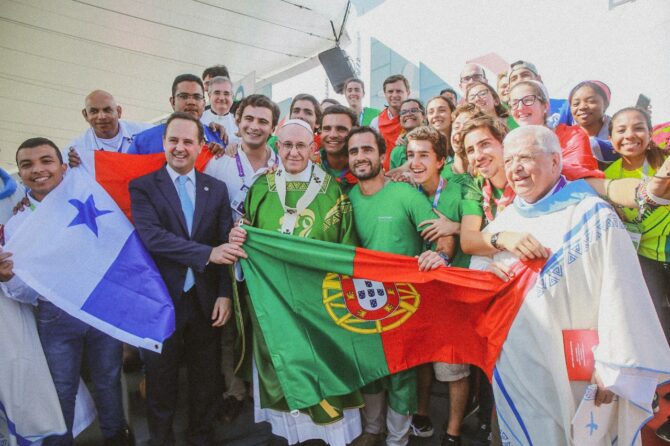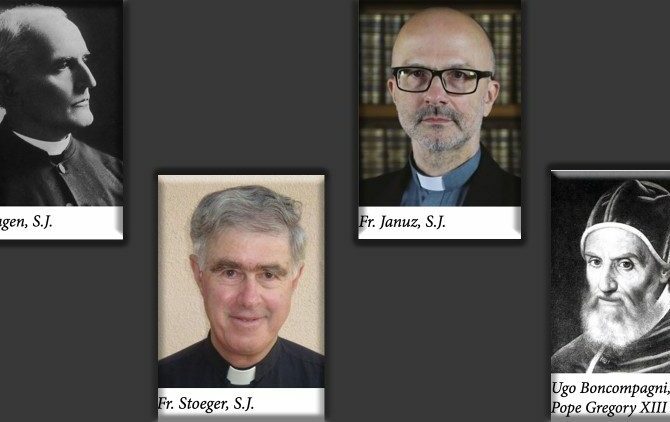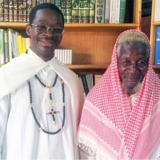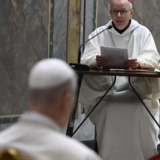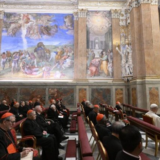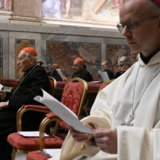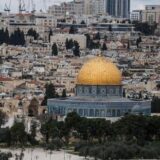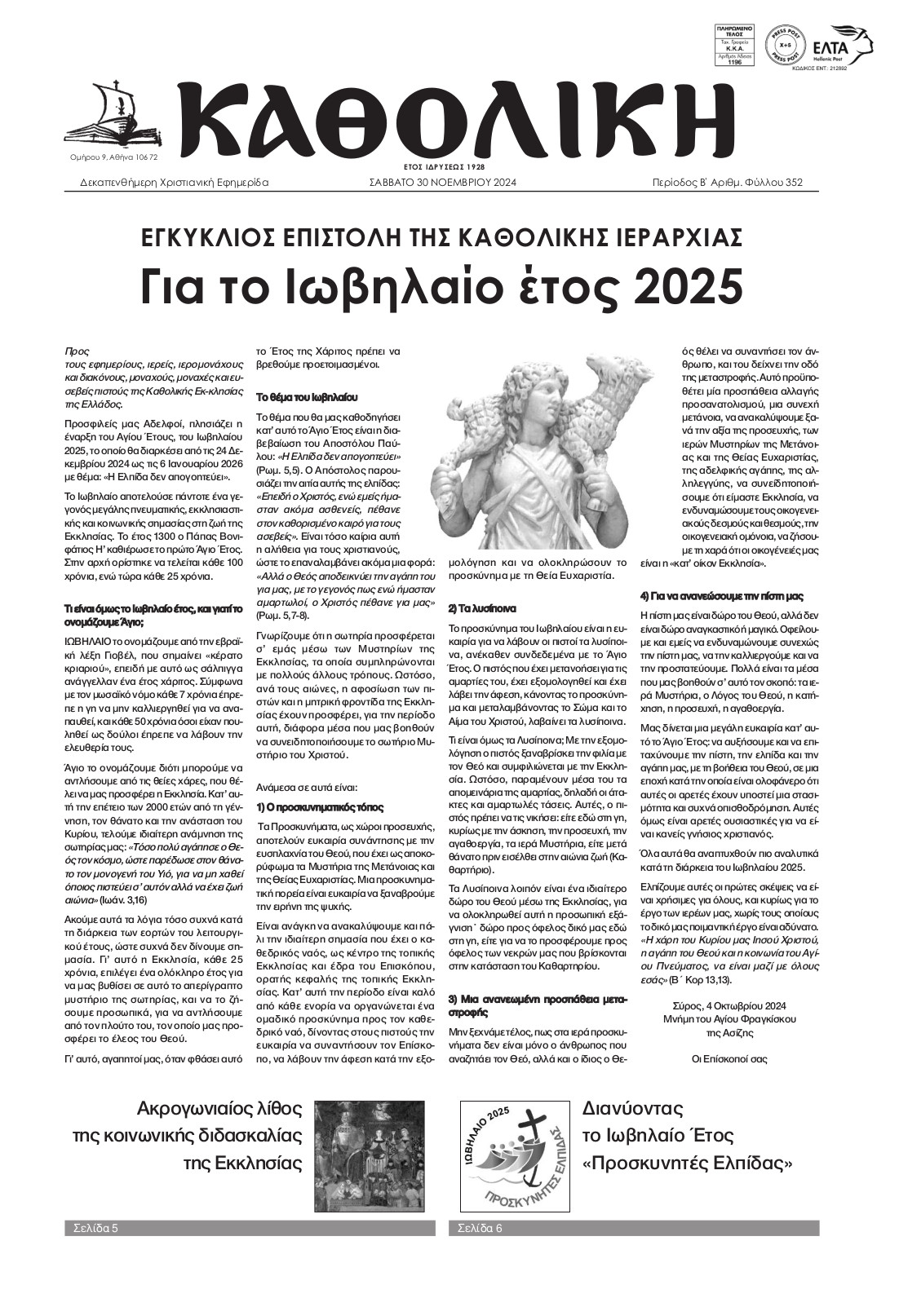
AUDIENCE WITH THE DIPLOMATIC CORPS ACCREDITED TO THE HOLY SEE
ADDRESS OF POPE FRANCIS
Sala Regia
Friday, 22 March 2013
[Video]
Your Excellencies, Ladies and Gentlemen,
Heartfelt thanks to your Dean, Ambassador Jean-Claude Michel, for the kind words that he has addressed to me in the name of everyone present. It gives me joy to welcome you for this exchange of greetings: a simple yet deeply felt ceremony, that somehow seeks to express the Pope’s embrace of the world. Through you, indeed, I encounter your peoples, and thus in a sense I can reach out to every one of your fellow citizens, with their joys, their troubles, their expectations, their desires.
Your presence here in such numbers is a sign that the relations between your countries and the Holy See are fruitful, that they are truly a source of benefit to mankind. That, indeed, is what matters to the Holy See: the good of every person upon this earth! And it is with this understanding that the Bishop of Rome embarks upon his ministry, in the knowledge that he can count on the friendship and affection of the countries you represent, and in the certainty that you share this objective. At the same time, I hope that it will also be an opportunity to begin a journey with those few countries that do not yet have diplomatic relations with the Holy See, some of which were present at the Mass for the beginning of my ministry, or sent messages as a sign of their closeness – for which I am truly grateful.
As you know, there are various reasons why I chose the name of Francis of Assisi, a familiar figure far beyond the borders of Italy and Europe, even among those who do not profess the Catholic faith. One of the first reasons was Francis’ love for the poor. How many poor people there still are in the world! And what great suffering they have to endure! After the example of Francis of Assisi, the Church in every corner of the globe has always tried to care for and look after those who suffer from want, and I think that in many of your countries you can attest to the generous activity of Christians who dedicate themselves to helping the sick, orphans, the homeless and all the marginalized, thus striving to make society more humane and more just.
But there is another form of poverty! It is the spiritual poverty of our time, which afflicts the so-called richer countries particularly seriously. It is what my much-loved predecessor, Benedict XVI, called the "tyranny of relativism", which makes everyone his own criterion and endangers the coexistence of peoples. And that brings me to a second reason for my name. Francis of Assisi tells us we should work to build peace. But there is no true peace without truth! There cannot be true peace if everyone is his own criterion, if everyone can always claim exclusively his own rights, without at the same time caring for the good of others, of everyone, on the basis of the nature that unites every human being on this earth.
One of the titles of the Bishop of Rome is Pontiff, that is, a builder of bridges with God and between people. My wish is that the dialogue between us should help to build bridges connecting all people, in such a way that everyone can see in the other not an enemy, not a rival, but a brother or sister to be welcomed and embraced! My own origins impel me to work for the building of bridges. As you know, my family is of Italian origin; and so this dialogue between places and cultures a great distance apart matters greatly to me, this dialogue between one end of the world and the other, which today are growing ever closer, more interdependent, more in need of opportunities to meet and to create real spaces of authentic fraternity.
In this work, the role of religion is fundamental. It is not possible to build bridges between people while forgetting God. But the converse is also true: it is not possible to establish true links with God, while ignoring other people. Hence it is important to intensify dialogue among the various religions, and I am thinking particularly of dialogue with Islam. At the Mass marking the beginning of my ministry, I greatly appreciated the presence of so many civil and religious leaders from the Islamic world. And it is also important to intensify outreach to non-believers, so that the differences which divide and hurt us may never prevail, but rather the desire to build true links of friendship between all peoples, despite their diversity.
Fighting poverty, both material and spiritual, building peace and constructing bridges: these, as it were, are the reference points for a journey that I want to invite each of the countries here represented to take up. But it is a difficult journey, if we do not learn to grow in love for this world of ours. Here too, it helps me to think of the name of Francis, who teaches us profound respect for the whole of creation and the protection of our environment, which all too often, instead of using for the good, we exploit greedily, to one another’s detriment.
Dear Ambassadors, Ladies and Gentlemen,
Thank you again for all the work that you do, alongside the Secretariat of State, to build peace and construct bridges of friendship and fraternity. Through you, I would like to renew to your Governments my thanks for their participation in the celebrations on the occasion of my election, and my heartfelt desire for a fruitful common endeavour. May Almighty God pour out his gifts on each one of you, on your families and on the peoples that you represent. Thank you!
UDIENZA AL CORPO DIPLOMATICO ACCREDITATO PRESSO LA SANTA SEDE
DISCORSO DEL SANTO PADRE FRANCESCO
Sala Regia
Venerdì, 22 marzo 2013
[Video]
Eccellenze,
Signore e Signori,
Ringrazio di cuore il vostro Decano, Ambasciatore Jean-Claude Michel, per le belle parole che mi ha rivolto a nome di tutti e con gioia vi accolgo per questo scambio di saluti, semplice ma nello stesso tempo intenso, che vuole essere idealmente l’abbraccio del Papa al mondo. Attraverso di voi, infatti, incontro i vostri popoli, e così posso, in un certo senso, raggiungere ciascuno dei vostri concittadini, con le sue gioie, i suoi drammi, le sue attese, i suoi desideri.
La vostra numerosa presenza è anche un segno che le relazioni che i vostri Paesi intrattengono con la Santa Sede sono proficue, sono davvero un’occasione di bene per l’umanità. È questo, infatti, che sta a cuore alla Santa Sede: il bene di ogni uomo su questa terra! Ed è proprio con questo intendimento che il Vescovo di Roma inizia il suo ministero, sapendo di poter contare sull’amicizia e sull’affetto dei Paesi che voi rappresentate, e nella certezza che condividete tale proposito. Allo stesso tempo, spero sia anche l’occasione per intraprendere un cammino con quei pochi Paesi che ancora non intrattengono relazioni diplomatiche con la Santa Sede, alcuni dei quali – li ringrazio di cuore – hanno voluto essere presenti alla Messa per l’inizio del mio ministero, o hanno inviato messaggi come gesto di vicinanza.
Come sapete, ci sono vari motivi per cui ho scelto il mio nome pensando a Francesco di Assisi, una personalità che è ben nota al di là dei confini dell’Italia e dell’Europa e anche tra coloro che non professano la fede cattolica. Uno dei primi è l’amore che Francesco aveva per i poveri. Quanti poveri ci sono ancora nel mondo! E quanta sofferenza incontrano queste persone! Sull’esempio di Francesco d’Assisi, la Chiesa ha sempre cercato di avere cura, di custodire, in ogni angolo della Terra, chi soffre per l’indigenza e penso che in molti dei vostri Paesi possiate constatare la generosa opera di quei cristiani che si adoperano per aiutare i malati, gli orfani, i senzatetto e tutti coloro che sono emarginati, e che così lavorano per edificare società più umane e più giuste.
Ma c’è anche un’altra povertà! È la povertà spirituale dei nostri giorni, che riguarda gravemente anche i Paesi considerati più ricchi. È quanto il mio Predecessore, il caro e venerato Benedetto XVI, chiama la “dittatura del relativismo”, che lascia ognuno come misura di se stesso e mette in pericolo la convivenza tra gli uomini. E così giungo ad una seconda ragione del mio nome. Francesco d’Assisi ci dice: lavorate per edificare la pace! Ma non vi è vera pace senza verità! Non vi può essere pace vera se ciascuno è la misura di se stesso, se ciascuno può rivendicare sempre e solo il proprio diritto, senza curarsi allo stesso tempo del bene degli altri, di tutti, a partire dalla natura che accomuna ogni essere umano su questa terra.
Uno dei titoli del Vescovo di Roma è Pontefice, cioè colui che costruisce ponti, con Dio e tra gli uomini. Desidero proprio che il dialogo tra noi aiuti a costruire ponti fra tutti gli uomini, così che ognuno possa trovare nell’altro non un nemico, non un concorrente, ma un fratello da accogliere ed abbracciare! Le mie stesse origini poi mi spingono a lavorare per edificare ponti. Infatti, come sapete la mia famiglia è di origini italiane; e così in me è sempre vivo questo dialogo tra luoghi e culture fra loro distanti, tra un capo del mondo e l’altro, oggi sempre più vicini, interdipendenti, bisognosi di incontrarsi e di creare spazi reali di autentica fraternità.
In quest’opera è fondamentale anche il ruolo della religione. Non si possono, infatti, costruire ponti tra gli uomini, dimenticando Dio. Ma vale anche il contrario: non si possono vivere legami veri con Dio, ignorando gli altri. Per questo è importante intensificare il dialogo fra le varie religioni, penso anzitutto a quello con l’Islam, e ho molto apprezzato la presenza, durante la Messa d’inizio del mio ministero, di tante Autorità civili e religiose del mondo islamico. Ed è pure importante intensificare il confronto con i non credenti, affinché non prevalgano mai le differenze che separano e feriscono, ma, pur nella diversità, vinca il desiderio di costruire legami veri di amicizia tra tutti i popoli.
Lottare contro la povertà sia materiale, sia spirituale; edificare la pace e costruire ponti. Sono come i punti di riferimento di un cammino al quale desidero invitare a prendere parte ciascuno dei Paesi che rappresentate. Un cammino difficile però, se non impariamo sempre più ad amare questa nostra Terra. Anche in questo caso mi è di aiuto pensare al nome di Francesco, che insegna un profondo rispetto per tutto il creato, il custodire questo nostro ambiente, che troppo spesso non usiamo per il bene, ma sfruttiamo avidamente a danno l’uno dell’altro.
Cari Ambasciatori,
Signore e Signori,
grazie ancora per tutto il lavoro che svolgete, insieme alla Segreteria di Stato, per costruire la pace ed edificare ponti di amicizia e di fraternità. Attraverso di voi, desidero rinnovare ai vostri Governi il mio grazie per la loro partecipazione alle celebrazioni in occasione della mia elezione, con l’auspicio di un fruttuoso lavoro comune. Il Signore Onnipotente ricolmi dei suoi doni ciascuno di voi, le vostre famiglie e i popoli che rappresentate. Grazie!
